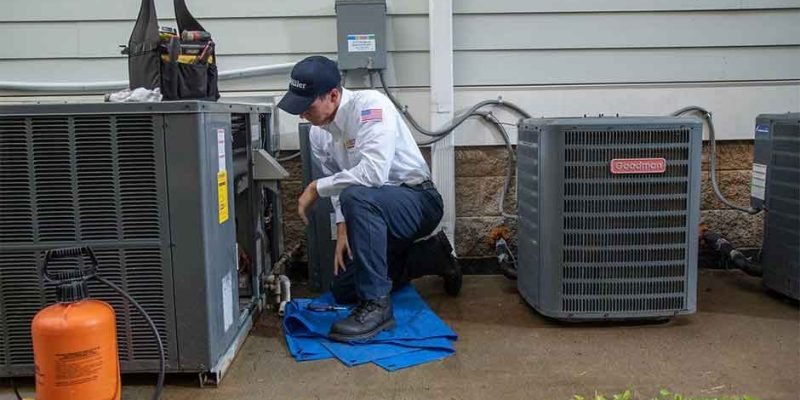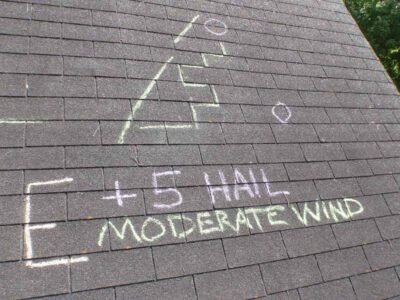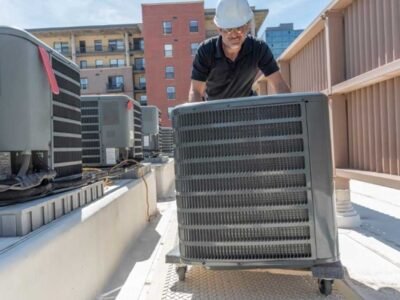Are you looking for the perfect heating and cooling system to make your home more comfortable year-round?
Upgrading your HVAC system can provide better temperature control and improved energy efficiency, but it can be overwhelming to figure out which system is best for your needs. Buying a new HVAC system doesn’t have to be stressful. We’re here to help!
Our comprehensive guide will walk you through everything from figuring out what kind of replacement unit you need, to calculating size requirements and getting quotes from contractors—so that when it comes time for installation, you’ll know exactly how to choose the right system for your home.
If you’re looking for some assistance, we recommend contacting an expert in your region. For example if you live in Arkansas, HVAC experts in Bentonville, AR will be able to assist you. However, if you want to start the search on your own, here are some tips for buying a new HVAC system.
What to consider when buying a new HVAC System
When you are looking to upgrade your HVAC system, there are some things to be mindful of. These include:
1. Size of the unit and your home
When purchasing a brand new HVAC unit, consider the unit’s size. The size of the unit will determine how much heating and cooling capacity it has. If you choose a unit that is too small, it will have to work overtime to heat or cool your home, which will lead to higher energy bills.
If you choose a unit that is too large, it will cycle on and off too frequently, which can also lead to higher energy bills and decreased comfort.
2. Efficiency
Also consider the desired efficiency when buying a new system. The efficiency of an HVAC system is measured by its seasonal energy efficiency ratio (SEER). The SEER rating shows the amount of energy the unit uses to produce one British thermal unit (BTU) of cooling output. The higher the SEER rating, the more efficient the unit is.
3. Cost
Of course, when buying a new HVAC system, note the cost. The initial cost of the unit will be a major consideration, but you should also consider the long-term costs associated with operating the unit. Units with higher SEER ratings typically cost more initially, but in the long run they will save you money.
4. Maintenance
Another factor to consider when buying a new HVAC system is maintenance. All HVAC systems require regular maintenance in order to function properly and efficiently. Some types of HVAC systems require more maintenance than others. For example, central air conditioners typically require more maintenance than window air conditioners.
5. Your local climate
Finally, you’ll want to take your local climate into consideration when choosing a new HVAC system. Do you live in an area with extreme temperatures? You will need a system that’s able to keep you warm or cool despite the conditions. However, if you reside in a milder climate, you may not need as powerful of a system.
Choosing an HVAC system that is appropriately sized for your local climate will help ensure that your home is comfortable all year round.
Different types of HVAC systems
There are a few different types of HVAC systems you can choose for your home. When buying a new HVAC system, consider what you need – heating or cooling – and narrow your options from there.
1. Central air conditioning
Central air conditioning systems are the most common type of HVAC system in the United States. Central AC systems are composed of an outdoor unit as well as one or more indoor units. The unit outdoors contains the compressor and the condenser while the evaporator coils are found in the indoor unit.
Central air conditioning systems are available in a variety of sizes to suit different homes and needs.
2. Heat Pumps
Heat pumps are a form of HVAC system that can be used for both heating and cooling. Heat pumps don’t generate heat themselves. They simply transfer heat from one place to another,
In the wintertime, heat pumps transfer heat into your home from outdoors, and in the summer, they do the reverse. Heat pumps are highly efficient in cooling and heating your home, and can save you money on your monthly energy bill. Consider exploring available heat pump grants to maximize the benefits of this energy-efficient technology for your home.
3. Furnaces
Furnaces are another type of HVAC system that is commonly used for heating homes. Furnaces work by burning fuel, such as natural gas or propane, to generate heat. The heat generated by furnaces is then distributed throughout the home via a system of ducts. Furnaces are available in a variety of efficiency levels, so it is important to choose one that is appropriate for your home and needs. If you want to upgrade or install a new furnace, it’s essential to consider the prices for a new furnace. For example, the new furnace cost in Calgary is around $4,500 for the most basic furnace and up to around $8,500 for a top-end model. Knowing the price and quality will help you make an informed decision aligned with your budget and heating requirements.
4. Boilers
Boilers are similar to furnaces in that they generate heat by burning fuel. However, instead of using ducts to distribute the heat throughout the home, boilers use radiators or radiant floor systems. Boilers are an efficient way to heat your home, and can also be used to generate hot water for domestic use.
5. Geothermal Systems
Geothermal systems are a type of HVAC system that uses the earth’s thermal energy to heat and cool homes. These systems consist of a ground loop, which is buried underground, and a heat pump, which transfers heat between the ground and the home. Geothermal systems are very efficient and help homeowners save on utility bills.
A guide to buying a new HVAC system: Takeaway
Buying a new HVAC system doesn’t have to be tedious or expensive. It will take some time to conduct the proper research and find out which system will best fit your needs. Always take climate into consideration as an ineffective system will be a waste of time and money and will leave your house’s climate uncomfortable to live in.
When hiring a contractor, be sure to ask around and get reviews so you can be confident you’re getting the best service.
If you need assistance, be sure to contact an HVAC professional. They will help you choose the right system for your specific needs.
















Comments